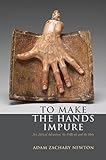To Make the Hands Impure : Art, Ethical Adventure, the Difficult and the Holy / Adam Zachary Newton.
Material type: TextPublisher: New York, NY : Fordham University Press, [2016]Copyright date: ©2016Description: 1 online resource (502 p.)Content type:
TextPublisher: New York, NY : Fordham University Press, [2016]Copyright date: ©2016Description: 1 online resource (502 p.)Content type: - 9780823263523
- 9780823273324
- Art and morals
- Ethics in literature
- Philosophy, Modern -- 20th century
- Philosophy, Modern -- 21st century
- Reader-response criticism
- Jewish Studies
- Literary Studies
- Philosophy & Theory
- RELIGION / Judaism / General
- "the book"
- Edward Said
- Emmanuel Levinas
- Ethics of Reading
- Hands
- Hermeneutics
- Materiality
- Mikhail Bakhtin
- Proximity
- Scriputre
- Stanley Cavell
- Text
- ethics
- touch/tactility
- tum'at yadayim
- 190 23
- online - DeGruyter
- Issued also in print.
| Item type | Current library | Call number | URL | Status | Notes | Barcode | |
|---|---|---|---|---|---|---|---|
 eBook
eBook
|
Biblioteca "Angelicum" Pont. Univ. S.Tommaso d'Aquino Nuvola online | online - DeGruyter (Browse shelf(Opens below)) | Online access | Not for loan (Accesso limitato) | Accesso per gli utenti autorizzati / Access for authorized users | (dgr)9780823273324 |
Browsing Biblioteca "Angelicum" Pont. Univ. S.Tommaso d'Aquino shelves, Shelving location: Nuvola online Close shelf browser (Hides shelf browser)

|

|

|

|

|

|

|
||
| online - DeGruyter Post-Mandarin : Masculinity and Aesthetic Modernity in Colonial Vietnam / | online - DeGruyter Levinas and the Night of Being : A Guide to Totality and Infinity / | online - DeGruyter The Techne of Giving : Cinema and the Generous Form of Life / | online - DeGruyter To Make the Hands Impure : Art, Ethical Adventure, the Difficult and the Holy / | online - DeGruyter Time Travel : The Popular Philosophy of Narrative / | online - DeGruyter The Poetics of Ruins in Renaissance Literature / | online - DeGruyter Coming / |
Frontmatter -- Contents -- Prologue. Meaningful Adjacencies -- Introduction. Laws of Tact and Genre -- Part One. Hands -- Chapter 1. Pledge, Turn, Prestige -- Chapter 2. Sollicitation and Rubbing the Text -- Chapter 3. Blaise Pascal, Henry Darger, and the Book in Hand -- Part Two. Genres -- Chapter 4. Ethics of Reading I -- Chapter 5. Ethics of Reading II -- Chapter 6. Ethics of Reading III -- Part Three. Languages -- Chapter 7. Abyss, Volcano, and the Frozen Swirl of Words -- Epilogue. The Book in Hand, Again -- Notes -- Bibliography -- Index of Proper Names -- Index of Topics and Works
restricted access online access with authorization star
http://purl.org/coar/access_right/c_16ec
How can cradling, handling, or rubbing a text be said, ethically, to have made something happen? What, as readers or interpreters, may come off in our hands in as we maculate or mark the books we read?For Adam Zachary Newton, reading is anembodied practice wherein "ethics" becomes a matter of tact-in the doubled sense of touch and regard. With the image of the book lying in the hands of its readers as insistent refrain, To Make the Hands Impure cuts a provocative cross-disciplinary swath through classical Jewish texts, modern Jewish philosophy, film and performance, literature, translation, and the material text.Newton explores the ethics of reading through a range of texts, from the Talmud and Midrash to Conrad's Nostromo and Pascal's Le Mémorial, from works by Henry Darger and Martin Scorsese to the National September 11 Memorial and a synagogue in Havana, Cuba. In separate chapters, he conducts masterly treatments of Emmanuel Levinas, Mikhail Bakhtin, and Stanley Cavell by emphasizing their performances as readers-a trebled orientation to Talmud, novel, and theater/film. To Make the Hands Impure stages the encounter of literary experience and scriptural traditions-the difficult and the holy-through an ambitious, singular, and innovative approach marked in equal measure by erudition and imaginative daring.
Issued also in print.
Mode of access: Internet via World Wide Web.
In English.
Description based on online resource; title from PDF title page (publisher's Web site, viewed 02. Mrz 2022)


